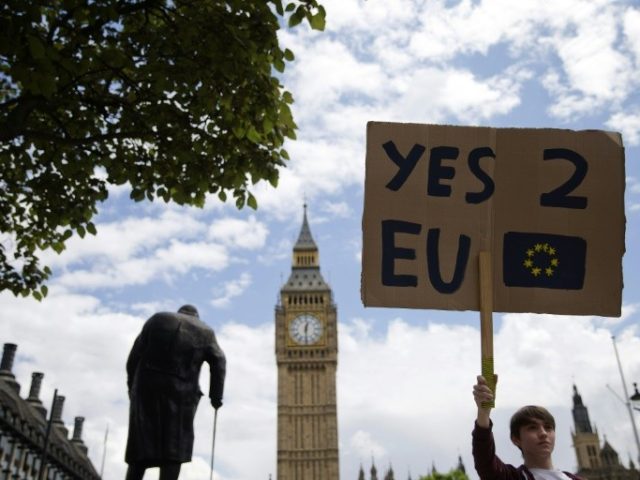This morning’s key headlines from GenerationalDynamics.com
- EU president Donald Tusk tells Britain: ‘Hard Brexit or No Brexit’
- Scotland considers new referendum to leave Britain and rejoin the EU
EU president Donald Tusk tells Britain: ‘Hard Brexit or No Brexit’

Turnalt sheep farm at the bottom of a U-shaped glen in Argyll, Scotland
The recent meteoric fall of the British pound sterling currency is just one of the reasons why concerns are growing about the fallout from the results of the June 23 Brexit referendum, which mandated that Britain leave the European Union. The pound has plunged 18% versus the dollar to its lowest level in 31 years. At the same time, many international businesses that previously have been using Britain as a gateway to Europe are now moving their operations from London to cities like Dublin, Frankfurt, Madrid and Warsaw.
The fall in the value of the pound means that the cost of imports like South African blueberries and Italian bathroom fixtures will be substantially higher. It could benefit exporters, who will get more money for their goods sold abroad, but since the UK imports much more than it exports, the economic news from Brexit suggests that there will be a substantial fall UK living standards.
During the Brexit campaign, the politicians make all kinds of moronic promises, such as we hear constantly from all politicians. One of those promises was that the UK would save 50 million pounds per day that was being sent to Brussels, and that that money could be used to bail out the crashing National Health Service.
Now a new report indicates that instead of saving 50 million pounds per week, the UK will be forced to pay to the EU an additional 350 million pounds per week, to cover shared EU liabilities, including unpaid debt and pension liabilities. This is being called a “Brexit divorce” bill.
More of the moronic promises had to do with Britain’s relationship with the EU after Brexit. The pro-Brexit campaign had promised that the EU would be anxious to grant Britain the same access to Europe’s single market that it had now, but without the requirement that Britain be subjected to control from Brussels. In particular, Britain would no have to accept Christian immigrants from Poland or Muslim immigrants from Syria and Afghanistan.
Since the vote, EU politicians said that there would no access to Europe’s single market unless Britain accepts EU’s four freedoms: freedom of movement for people, goods, capital and services. Britain would have to accept freedom of movement of people, along with the other three freedoms.
This was emphasized in a speech Thursday by European Commission president Donald Tusk:
I do not need to remind you that the creation of the European Union was a response to a historic catastrophe. The source of this catastrophe was the questioning of those values and treating national egoisms, the use of violence and the unlimited right of the stronger to dictate conditions for the weaker as the norm.
As Stefan Zweig wrote in those days: “It is an iron law that those who will be caught up in the great movements determining the course of their times always fail to recognize them in their early stages.” …
Finally, let’s move on to Brexit. … Our task will be to protect the interests of the EU as a whole and the interests of each of the 27 member states. And also to stick unconditionally to the Treaty rules and fundamental values. By this I mean, inter alia, the conditions for access to the single market with all four freedoms. There will be no compromises in this regard.
When it comes to the essence of Brexit, it was largely defined in the UK during the referendum campaign. We all remember the promises, which cumulated in the demand to “take back control”.
Namely the “liberation” from European jurisdiction, a “no” to the freedom of movement or further contributions to the EU budget. This approach has definitive consequences, both for the position of the UK government and for the whole process of negotiations. Regardless of magic spells, this means a de facto will to radically loosen relations with the EU, something that goes by the name of “Hard Brexit”.
This scenario will in the first instance be painful for Britons. In fact, the words uttered by one of the leading campaigners for Brexit and proponents of the “cake philosophy” was pure illusion: that one can have the EU cake and eat it too. To all who believe in it, I propose a simple experiment. Buy a cake, eat it, and see if it is still there on the plate.
The brutal truth is that Brexit will be a loss for all of us. There will be no cakes on the table. For anyone. There will be only salt and vinegar. If you ask me if there is any alternative to this bad scenario, I would like to tell you that yes, there is.
And I think it is useless to speculate about “soft Brexit” because of all the reasons I’ve mentioned. These would be purely theoretical speculations. In my opinion, the only real alternative to a “Hard Brexit” is “no Brexit”.
Britain will remain part of the European Union for at least another 30 months. That’s because Britain’s new prime minister Theresa May has not yet invoked “Article 50,” and has said she will do so in March of next year. Invoking Article 50 begins a two-year negotiation process for Britain to leave the EU. Donald Tusk is clearly suggesting that May not invoke Article 50 at all, a decision that would infuriate a large percentage of British (I mean English) voters. Guardian (London) and Independent (London) and International Business Times (London)
Related Articles
- Fallout from Brexit: Impact on geopolitics, economics, and stock markets (25-Jun-2016)
- Bank of England uses ‘sledgehammer’ stimulus to fight Brexit slowdown (05-Aug-2016)
- Obamacare continues death spiral as Britain’s NHS faces strike (26-Apr-2016)
Scotland considers new referendum to leave Britain and rejoin the EU
The Brexit referendum revealed that Britain’s population is badly split, but not along the usual Labor-Conservative lines. Instead, it was split geographically (England and Wales were pro-Brexit, Scotland and Northern Ireland were anti-Brexit), and it was split by generation, with Millennials furious at Boomers for the vote.
On September 18, 2014, Scotland held a referendum on the question of whether Scotland should leave the UK and become an independent country. This would have dissolved the 1707 union between England and Scotland that came out of the War of the Spanish Succession. Voters rejected the referendum, with 55.3% voting no.
Many in Scotland are bitter that they are going to be forced to leave the European Union even though they voted 62% to stay. For that reason, Scotland’s First Minister, Nicola Sturgeon, has said that she will introduce a plan for a new Scottish independence referendum.
Scotland is one of the four nations of the United Kingdom, the other three being England, Wales, and Northern Ireland. Of the 63 million people in the UK, England has 53 million, and Scotland has only 5 million.
Scotland is far less densely populated than England, which means that Scotland welcomes immigrants to fill jobs, causing some Scots to call the English “xenophobic.” In her speech on Thursday, Nicola Sturgeon accused England of being undemocratic:
They are using the result as cover for a hard Brexit for which they have no mandate – but which they are determined to impose, regardless of the ruinous consequences. Worse still, they intend to do all of this with no parliamentary authority. Virtually no scrutiny whatsoever. And to do it with complete disregard for Scotland’s democratic voice. That is simply not acceptable.
Analysts consider it unlikely that Sturgeon will get her way. Polls show that the Scottish people still do not support separation from England. Even more important, few people believe that it would even be possible for Scotland to be in the European Union, and not in the United Kingdom. Reuters and International Business Times
Related Articles
- Fallout from Brexit: Impact on geopolitics, economics, and stock markets (25-Jun-2016)
- Britain’s Millennials are furious at Boomers for Brexit vote (26-Jun-2016)
- Scotland faces reality as independence referendum approaches (18-Feb-2014)
KEYS: Generational Dynamics, Britain, Brexit, European Commission, Donald Tusk, Theresa May, Article 50, Scotland, Nicola Sturgeon
Permanent web link to this article
Receive daily World View columns by e-mail

COMMENTS
Please let us know if you're having issues with commenting.